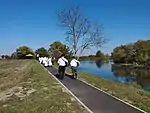Bogdanovci | |
|---|---|
 | |
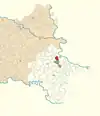 | |
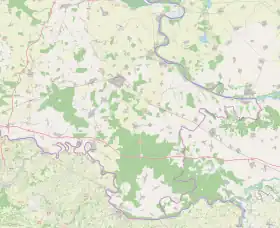 Bogdanovci Location in Croatia 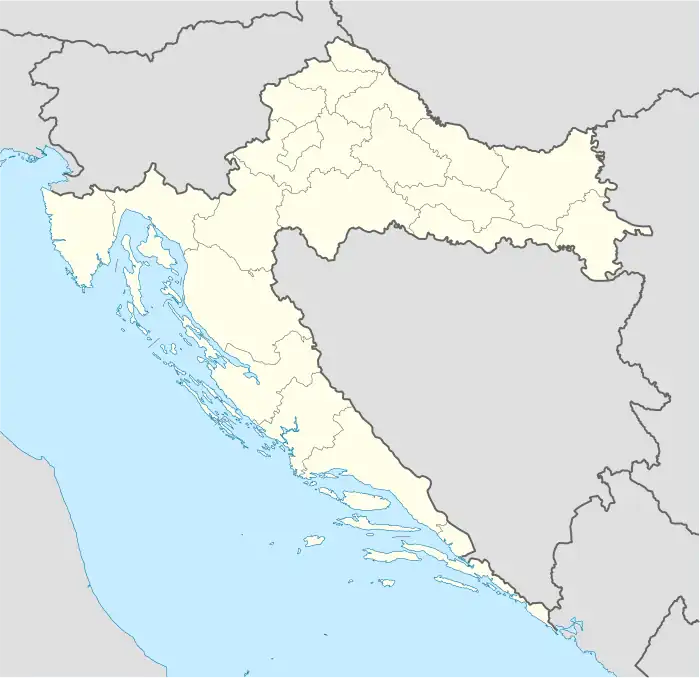 Bogdanovci Bogdanovci (Croatia) 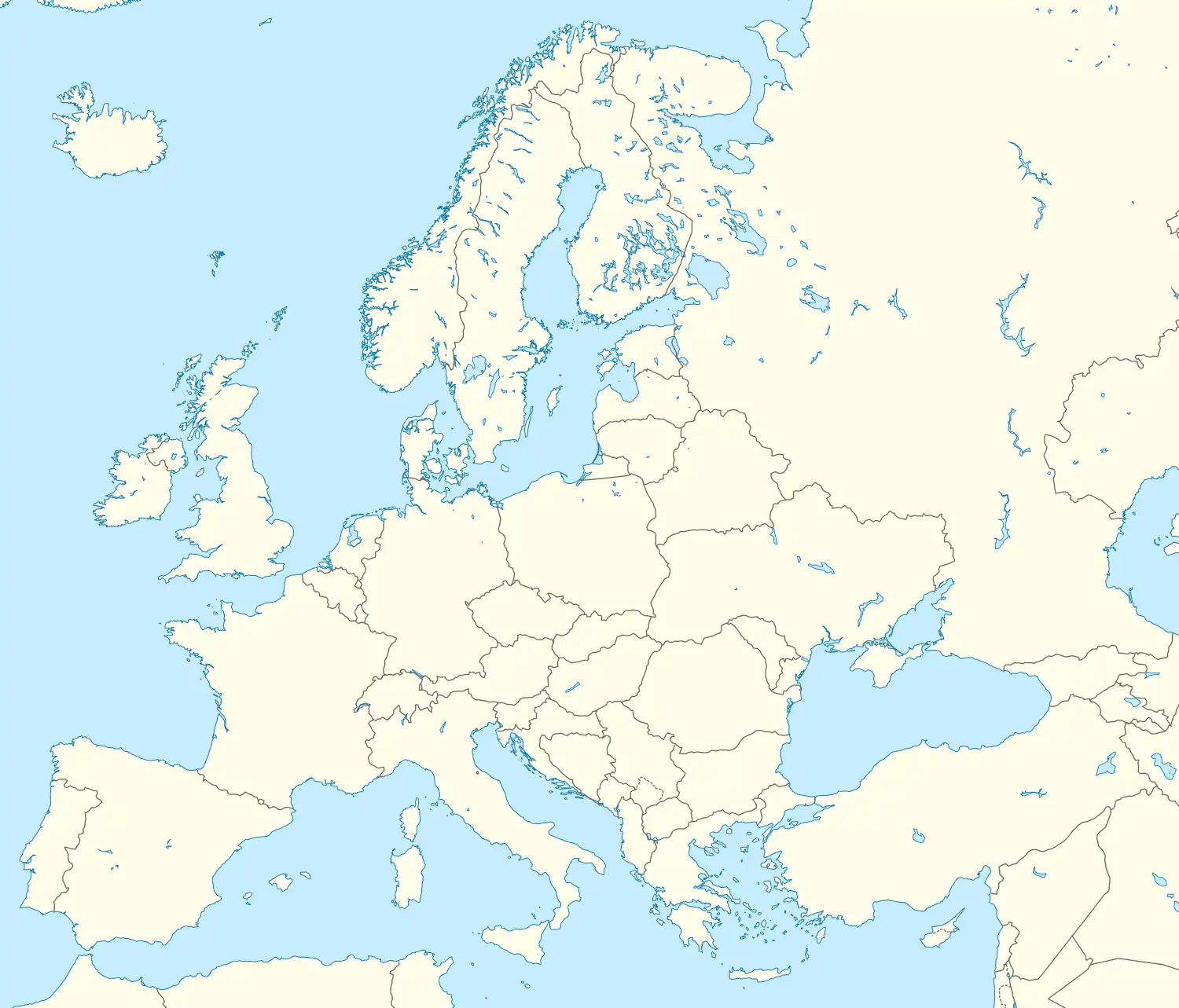 Bogdanovci Bogdanovci (Europe) | |
| Coordinates: 45°20′N 18°56′E / 45.333°N 18.933°E | |
| Country | |
| Region | Syrmia (Podunavlje) |
| County | |
| Municipal seat Largest settlement | Bogdanovci Petrovci |
| Area | |
| • Municipality | 51.6 km2 (19.9 sq mi) |
| • Urban | 16.9 km2 (6.5 sq mi) |
| Population (2021)[2] | |
| • Municipality | 1,545 |
| • Density | 30/km2 (78/sq mi) |
| • Urban | 614 |
| • Urban density | 36/km2 (94/sq mi) |
| Time zone | UTC+1 (CET) |
| • Summer (DST) | UTC+2 (CEST) |
| Postal code | ? |
| Area code | 32 |
| Vehicle registration | VK |
| Website | opcina-bogdanovci |
Bogdanovci (Rusyn: Богдановци, Serbian Cyrillic: Богдановци, Hungarian: Bogdánfalva) is a village and municipality in the Vukovar-Syrmia County in eastern Croatia. It is located a few kilometers south of Vukovar in eastern Slavonia. Bogdanovci is underdeveloped municipality which is statistically classified as the First Category Area of Special State Concern by the Government of Croatia.[3]
History
The village was established in the Middle Ages before the Ottoman conquest of the region as a subsidiary settlement of the former village of Mikole.[4] Following the Ottoman conquest Mikole was abandoned with majority of residents moving to Bogdanovci.[4] In the second half of 17th century Calvinists constituted significant part of the local population but they were converted into Catholicism by Franciscan monks who moved to Vukovar from Srijemske Laze.[4]
Population
In the 2011 census, the total population is 1,960, in the following settlements:[5]
- Bogdanovci, population 710
- Petrovci, population 864
- Svinjarevci, population 386
In the 2011 census there were:[6]
- 56.17% Croats,
- 22.65% Rusyns,
- 9.59% Serbs,
- 7.55% Ukrainians,
- 2.35% Albanians
Politics
Minority councils
Directly elected minority councils and representatives are tasked with consulting tasks for the local or regional authorities in which they are advocating for minority rights and interests, integration into public life and participation in the management of local affairs.[7] At the 2023 Croatian national minorities councils and representatives elections Albanians, Pannonian Rusyns, Serbs and Ukrainians of Croatia fulfilled legal requirements to elect 10 members minority councils of the Bogdanovci Municipality with some councils electing less than 10 but more than 5 members.[8]
References
- ↑ Register of spatial units of the State Geodetic Administration of the Republic of Croatia. Wikidata Q119585703.
- ↑ "Population by Age and Sex, by Settlements, 2021 Census". Census of Population, Households and Dwellings in 2021. Zagreb: Croatian Bureau of Statistics. 2022.
- ↑ Lovrinčević, Željko; Davor, Mikulić; Budak, Jelena (June 2004). "AREAS OF SPECIAL STATE CONCERN IN CROATIA- REGIONAL DEVELOPMENT DIFFERENCES AND THE DEMOGRAPHIC AND EDUCATIONAL CHARACTERISTICS". Ekonomski pregled, Vol.55 No.5-6. Archived from the original on 18 August 2018. Retrieved 25 August 2018.
- 1 2 3 Mirko Marković (2003). Istočna Slavonija: Stanovništvo i naselja. Zagreb: Naklada Jesenski i Turk. p. 65. ISBN 9532221239.
- ↑ "Population by Age and Sex, by Settlements, 2011 Census: Bogdanovci". Census of Population, Households and Dwellings 2011. Zagreb: Croatian Bureau of Statistics. December 2012.
- ↑ "Population by Ethnicity, by Towns/Municipalities, 2011 Census: County of Vukovar-Sirmium". Census of Population, Households and Dwellings 2011. Zagreb: Croatian Bureau of Statistics. December 2012.
- ↑ "Manjinski izbori prve nedjelje u svibnju, kreću i edukacije". T-portal. 13 March 2023. Retrieved 2 May 2023.
- ↑ "Informacija o konačnim rezultatima izbora članova vijeća i izbora predstavnika nacionalnih manjina 2023. XVI. VUKOVARSKO-SRIJEMSKA ŽUPANIJA" (PDF) (in Croatian). Državno izborno povjerenstvo Republike Hrvatske. 2023. p. 11-12. Archived from the original (PDF) on 3 June 2023. Retrieved 3 June 2023.

